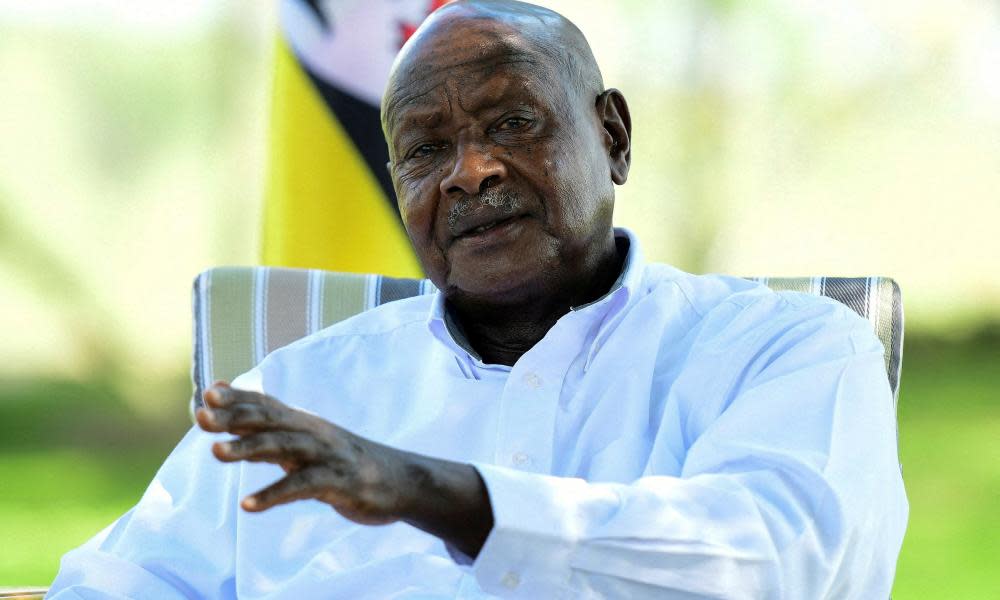The Observer view on Uganda’s anti-gay laws: grotesque, legalised bigotry

Uganda is one of the youngest and fastest growing countries in the world. Nearly half of its 45 million-strong population in 2020 were under 14. Roughly 75% were under 30. Total numbers are projected to grow to 141 million by 2065. Against this extraordinarily fecund demographic backdrop, fears expressed by its president, Yoweri Museveni, that homosexuality threatens the “procreation of the human race” appear absurdly and offensively misplaced.
Museveni, 78, cannot be counted among these new Ugandan generations. He has been in charge since 1986, having seized power in a violent coup. In 2005, he agreed to the creation of a multi-party democracy, but his authoritarian grip on the country has never relaxed. Corruption and intimidation of political opponents are rife. Vote-fixing and fraud have marred successive elections, according to the UK, EU and US.
Is a smile, a hug or a kiss now a criminal offence if shared with a non-state-approved person?
Museveni plainly cares little for the poor opinions of western governments still tainted, in his mind at least, by the colonial past. And, sadly for Ugandans keen to build a free, open and democratic society that respects the rights and choices of all its members, he shows no sign of retiring. In 2017, he removed the legal age limit for presidential candidates.
Yet the extent to which this anachronistic figure is out of time and out of date is vividly underscored by his latest, most grotesque excess: last week’s adoption of the world’s harshest anti-LGBTQ+ law, which imposes the death penalty or life imprisonment for certain homosexual acts. “Recruitment, promotion and funding” of same-sex “activities” may incur up to 20 years in jail, “attempted aggravated homosexuality” 14 years.
Consider the implications. Is a smile, a hug or a kiss a criminal offence in Museveni’s Uganda if shared with a non-state-approved person? Is it illegal to fall in love? And what should a parent do if a child shows signs of what the president calls “deviations”? Shop him or her to the morality police? How disgusting.
The fact that all but two of the parliament’s 389 MPs voted for the law, known as the Anti-Homosexuality Act, shows that homophobia is sadly prevalent among Uganda’s elite. But his cronies’ hackneyed defence – that the strong condemnation issued by US president Joe Biden, the UK and many others is the product of a bullying colonial mindset intent on subverting “African family values” – is both risible and contemptible.
Progress on tackling Aids and HIV, a serious problem in sub-Saharan Africa, is now ‘in grave jeopardy’, campaigners say
Campaigners say that by rendering discrimination and prejudice respectable, the law undermines universal human rights, including freedom of expression and association. It will inevitably damage Ugandan business, investment and tourism. Health workers and Aids organisations, including UNAids, warn, meanwhile, of a more immediate danger. Progress on tackling Aids and HIV, a serious problem in sub-Saharan Africa, is now “in grave jeopardy”, they say.
“LGBTQI+ people in Uganda increasingly fear for their safety and security, and people are being discouraged from seeking vital health services for fear of attack, punishment and further marginalisation,” the Aids organisations said in a joint statement. The law will intensify associated stigma – and stigma can be every bit as lethal as the illness itself.
Museveni and supporters say they are defending their traditions and beliefs against the intrusion of alien, western socio-cultural ideas. Yet evidence has emerged that extreme homophobia in Uganda and the region is being whipped up by ultra-conservative American evangelical Christians.
In the name of human decency, if for no other reason, Uganda must scrap this obscene piece of legalised bigotry.

 Yahoo News
Yahoo News 
